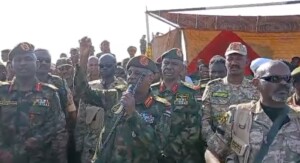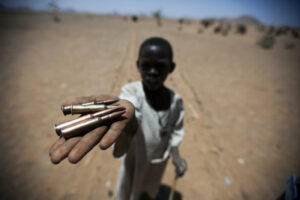Sudan anti-junta demos face brutal resistance
At least one demonstrator has died as hundreds of thousands of Sudanese took to the streets across nine states yesterday, to mark the anniversary of the dawn coup d’état of October 25, 2021. In marches across the country, protesters demanded the overthrow of the military junta, and a return to democracy and civilian rule. Marchers were met with fierce resistance from Sudan’s security forces.
 Mass protest march in Khartoum on Tuesday to mark the first anniversary of the October 25 2021 coup (Photo: Social media)
Mass protest march in Khartoum on Tuesday to mark the first anniversary of the October 25 2021 coup (Photo: Social media)
At least one demonstrator has died as hundreds of thousands of Sudanese took to the streets across nine states yesterday, to mark the anniversary of the dawn coup d’état of October 25, 2021. In marches across the country, protesters demanded the overthrow of the military junta, and a return to democracy and civilian rule. Marchers were met with fierce resistance from Sudan’s security forces. Many more injured as tear gas and stun grenades were used against peaceful protesters.
In measures to pre-empt the marches, authorities in Khartoum cut off internet services for mobile phones on Tuesday morning, and closed a number of main roads, as well as all bridges linking the capital with Omdurman and Khartoum North (Bahri), except for the Soba and Halfaya bridges.
Protesters gathered at more than 20 muster points with the aim to converge on the Republican Palace in central Khartoum. Large numbers of military personnel were deployed along the anticipated paths of the processions.
Most of the schools in Khartoum closed their doors without an official decision from the state government, while most government and private facilities stopped working on Tuesday in anticipation of the demonstrations.
The marchers were met with volleys of tear gas and stun grenades. In Khartoum, the marches reached El Gasr Street, despite the tight security barriers, but they retreated due to the excessive resistance. However the security forces impeded the arrival of the demonstrators from Khartoum Bahri and Omdurman by using excessive violence and closing bridges with containers. The Bahri Neighbourhood Committees called for a complete closure of the city, calling on the revolutionaries to occupy the streets. At least one protester was killed in Khartoum, reportedly after being run over by a military vehicle.

The Bahri Neighbourhood Committees announced that three protesters were seriously injured in the neck from tear gas and stun grenades. Demonstrators from Omdurman said that a number of injuries were caused by the use of excessive violence in front of the main hospital. Activist in voluntary work, Nazim Siraj, told Radio Dabanga that no gunshot injuries were reported in Khartoum.
In El Gezira, the resistance committees said that a number of protesters were injured by tear gas.
The South Darfur government announced the closure of schools for a week in anticipation of the demonstrations, while the states of El Gezira, Red Sea, El Gedaref, North Darfur, and North Kordofan announced an official holiday on Tuesday due to the demonstrations.
Processions took place in Wad Madani, Atbara, El Fasher, Zalingei, Port Sudan, Kassala, El Gedaref, Kadugli, El Obeid, and other cities to demand the overthrow of the junta.
North Darfur
In North Darfur, hundreds of demonstrators approached Freedom Square in El Fasher from three directions. In an interview with Sudan Today on Radio Dabanga, Mohamed Salem from the Democratic Alliance of Lawyers called for a return to the democratic track and the restoration of civil authority and the institutions of power.
In eastern Sudan, the processions in Port Sudan left from the public parking lot to El Buseiri Plaza Street, passing through the Workers’ Bank, and then to the railway. Demonstrators said that the procession was subjected to repression using tear gas, stun grenades and batons by the security forces. Hundreds also demonstrated in Kassala and El Gedaref, demanding civilian rule.
Activist Nujoud El Shalali told Radio Dabanga that in Atbara, marchers converged on the new bridge, bearing the slogan: 'No negotiation, no partnership, no legitimacy'. She confirmed that the resistance committees closed the main roads with barricades.
Emergency lawyers condemn violence and use of bullets
Emergency lawyers condemned the authorities’ shutdown of internet service in Sudan since Tuesday morning. They also condemned excessive violence in the face of peaceful demonstrators and the alleged use of live bullets in the shadow of a deliberate blackout.
Emergency lawyers said in a press statement that cutting off the internet is a flagrant and flagrant violation of Article (19) of the Universal Declaration of Human Rights. They explained that cutting off the Internet service deprives a basic right related to the exchange of information, communication, and basic services related to health care, education, and publishing.
‘Sabotage’
The Sudanese police have accused the demonstrators of being “forces trained in armed military formations that adopted violence and sabotage”.
The official spokesperson for the police said that what happened confirms the presence of “organised and rebel groups and sleeper cells that use edged weapons, firearms, and explosive devices”, accusing them of “targeting the security of the capital under the influence of drugs and toxic substances” and “working to achieve their goals under a political cover”.
The groups faced by the police carried flags with colours and slogans calling for violence, he said. They carried tools for breaking and cutting, and were followed by unidentified motorcycles, complete with armaments.
The police spokesperson asserted that “the processions are devoid of media and partisan and peaceful slogans,” and accused the demonstrators of “belonging to illegal groups and organisations that do not want to announce themselves”. He appealed to the Ministry of Justice and the legislative body “to impose exceptional measures” to confront these groups.











 and then
and then